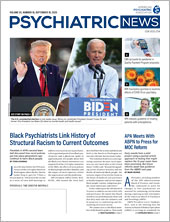Esketamine Approved for MDD With Suicidal Ideation or Behavior
The Food and Drug Administration (FDA) has approved Spravato (esketamine) CIII nasal spray to be used along with an oral antidepressant to treat depressive symptoms in adults with major depressive disorder with acute suicidal ideation or behavior, Janssen Pharmaceutical Companies of Johnson & Johnson announced in August. The approval is based on two identical phase 3 clinical trials in which participants who received esketamine plus comprehensive care demonstrated a significant, rapid reduction of depressive symptoms within 24 hours.
In the trials, adults with moderate-to-severe major depressive disorder who had active suicidal ideation and intent were randomized to receive either 84 mg of esketamine or placebo nasal spray twice a week for four weeks. After the first dose, a one-time dose reduction to 56 mg of esketamine was allowed for patients unable to tolerate the 84 mg dose. All patients received comprehensive standard of care treatment, including an initial inpatient psychiatric hospitalization and a newly initiated or optimized oral antidepressant treatment. At enrollment, all patients had Montgomery-Åsberg Depression Rating Scale (MADRS) scores higher than 28. The primary efficacy measure was the change from baseline in the MADRS total score at 24 hours after first dose.
In each study, MADRS scores dropped approximately 16 points for the esketamine group compared with roughly 12 points in the placebo group. Both the esketamine and placebo groups continued to improve between four hours and 25 days. In one study, 41% of the 111 patients in the esketamine group achieved clinical remission of depression compared with 34% of the 112 patients in the placebo group. In the other study, 43% of the 113 patients in the esketamine group achieved clinical remission of depression compared with 27% of the 113 patients in the placebo group.
BrainsWay TMS Device Gets OK for Smoking Cessation
In August, BrainsWay announced that its Deep Transcranial Magnetic Stimulation (TMS) System received clearance from the FDA for use as an aid in short-term smoking cessation in adults.
In a randomized trial, 262 patients received either treatment with the system or a sham treatment five days a week for three weeks, followed by an additional session once a week for three weeks. Patients had an average of 26 years of smoking, and none had been able to quit after multiple attempts.
The primary endpoint of the study was a comparison between the two groups of the four-week continuous quit rate. The continuous quit rate represents abstinence during a consecutive four-week period at any point between the start of treatment and the follow-up visit four months later. Patients kept a diary of their smoking habits and took urine tests to confirm whether they had smoked.
Among patients who completed four weeks of treatment, the continuous quit rate was 28.4% in the treatment group and 11.7% in the sham group.
FDA Grants Priority Review for Aducanumab for Alzheimer’s Disease
The FDA has given priority review to the Biologics License Application for the investigational biologic aducanumab, Biogen and Eisai Co. Ltd. announced in August. Aducanumab, an investigational human monoclonal antibody given as a monthly intravenous infusion, targets amyloid beta, a sticky compound thought to cause Alzheimer’s disease by accumulating in the brain.
Biogen’s application includes data from several clinical trials, including the phase 3 EMERGE trial. In EMERGE, 1,638 patients with early stage Alzheimer’s disease were treated with aducanumab or placebo for 78 weeks. Those who received aducanumab experienced a reduction of 22% on the Clinical Dementia Rating-Sum of Boxes (CDR-SB) scores at 78 weeks compared with those who received placebo. They also experienced a consistent reduction of clinical decline as measured by the Mini-Mental State Examination, the Alzheimer’s Disease Assessment Scale–Cognitive Subscale 13 Items, and the Alzheimer’s Disease Cooperative Study–Activities of Daily Living Inventory Mild Cognitive Impairment Version compared with those who received placebo.
Patients received brain scans at 26 and 78 weeks. The scans revealed a reduction of amyloid plaques in the brains of those who received aducanumab compared with the brains of those who received placebo.
Phase 3 Data Positive for Insomnia Drug
In July Idorsia announced positive results in a second phase 3 trial of its investigational dual orexin receptor agonist daridorexant for insomnia.
In the trial, 924 adults with insomnia received daridorexant (10 mg or 25 mg) or placebo once in the evening for three months. Compared with patients who took placebo, those who took 25 mg of daridorexant experienced significantly improved sleep maintenance as measured by polysomnography in a sleep lab and as recorded in patient diaries. The results were statistically significant at the end of the first month and at the end of the third month.
In the first phase 3 trial, which Idorsia reported in April, 930 patients with insomnia received either 25 mg or 50 mg daridorexant or placebo once nightly for three months. Compared with patients who took placebo, those who took either dose of daridorexant fell asleep faster and experienced improved sleep maintenance as measured by polysomnography in a sleep lab and as recorded in patient diaries. Daridorexant 50 mg also significantly improved daytime functioning. All results were sustained over the entirety of the trial.
Idorsia plans to file a New Drug Application for daridorexant at the end of the year. ■
